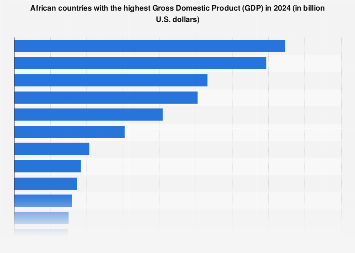Exploring the Statistics: African Countries with the Highest GDP in 2024
In an ever-changing global economic landscape, understanding the Gross Domestic Product (GDP) of nations provides valuable insights into their economic health and potential for growth. The International Monetary Fund (IMF) and Statista have recently unveiled a comprehensive analysis showing the African countries with the highest GDP in 2024. This report sheds light on the economic trajectories of these nations and their place on the global stage.
Economic Context and Background
The GDP of a country signifies the total value of all goods and services produced over a specific period and is a crucial indicator of economic performance. Over the past decade, several African countries have experienced significant economic transformation. Factors such as natural resource discoveries, foreign investments, and improvements in governance and infrastructure have played vital roles in shaping their economies.
However, recent years have not been without challenges. The COVID-19 pandemic had profound impacts worldwide, causing economic contractions that were particularly severe in developing regions. African economies, characterized by their diversity, faced varied impacts dependent on their economic structure, healthcare infrastructure, and ability to implement effective pandemic response measures.
Key Findings from the 2024 GDP Report
The IMF report highlights the following countries as having the highest GDP in Africa for the year 2024:
-
Nigeria: Dominating the chart, Nigeria remains Africa’s largest economy. The country’s economic resilience can be attributed to its large population, a mix of industrial sectors, and substantial oil exports. Although fluctuating oil prices and internal conflicts pose ongoing challenges, Nigeria’s economy shows significant potential for diversification and growth in sectors like agriculture and technology.
-
South Africa: Often regarded as the most industrialized country in Africa, South Africa continues to maintain its strong economic influence. The country’s GDP figures reflect robust performance in financial services, manufacturing, and mining sectors. However, issues such as employment rates and political instability remain hurdles.
-
Egypt: As a transcontinental nation, Egypt’s position is strategic, with strengths in tourism, natural gas exports, and the Suez Canal contributing significantly to its GDP. The country has been investing in expanding its infrastructure and tapping into renewable energy sources to boost economic growth further.
-
Algeria: Rich in hydrocarbons, Algeria’s economy is heavily reliant on its oil and gas industry. Efforts to diversify the economy by investing in renewable energy and the agriculture sector are underway, showing promising signs of future growth.
- Morocco: Known for its diversified economy, Morocco excels in tourism, agriculture, and phosphates mining. Recent years have seen growing investments in renewable energy and automotive industries, positioning Morocco as a burgeoning economic hub in North Africa.
Looking Ahead
The report’s findings suggest a positive trajectory for Africa’s top economies, underpinned by ongoing efforts to diversify economies and reduce dependency on single industries. Investments in technology, infrastructure development, and education are likely to play pivotal roles in sustaining economic growth.
However, persistent challenges such as political instability, healthcare infrastructure, and inclusive growth need continuous addressal to ensure robust economic performance. The ability of these nations to navigate global economic uncertainties and internal challenges will dictate their economic future.
In sum, the IMF’s report on African countries with the highest GDP in 2024 offers critical insights into the continent’s economic landscape. By focusing on sustainable growth and diversification, these nations are paving the way for a more resilient and prosperous future.
For a detailed view of the GDP data and further statistics, visit Statista.
